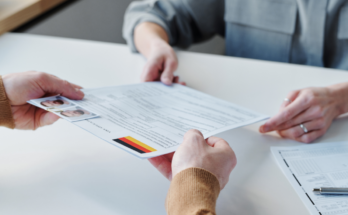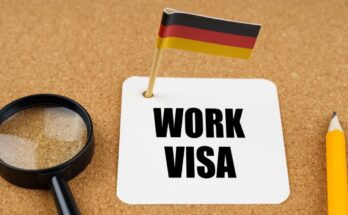Germany Work Visa Requirements: Germany is a popular destination for immigrants seeking opportunities and a higher standard of living.
This guide details the essential Germany work visa requirements for immigrants, ensuring you’re well-prepared for your journey.
Overview of Germany Work Visas
A Germany work visa is a legal authorization that allows non-EU nationals to live and work in Germany. This document is essential for immigrants because it legally verifies their employment status and residency in the country. Securing a work visa is the first step for any non-EU citizen wishing to undertake employment in Germany, ensuring compliance with German labor laws and regulations.
Germany offers a variety of work visas to accommodate different professional qualifications and employment scenarios. Here are the primary types of work visas available in Germany:
- General Employment Visa: For individuals with a job offer in professions requiring general qualifications.
- Specialist Professional Visa: Aimed at highly skilled workers or those with specific expertise in areas like IT, engineering, or science.
- Blue Card EU: For highly-qualified non-EU citizens, allowing them to stay and work in Germany with the possibility of EU residency later.
- Self-Employed Visa: For entrepreneurs and freelancers planning to establish a business or work independently in Germany.
- Working Holiday Visa: Available to young adults from certain countries, this visa allows them to work and travel in Germany.
- Internship Visa: Issued to foreign students and recent graduates who want to undertake an internship in Germany.
- Artist Visa: Specifically designed for artists and performers wishing to work in Germany.
However, each visa type has specific requirements and is tailored to different employment situations, making it important for prospective applicants to carefully choose the visa that best fits their professional profile and career objectives.
Eligibility Criteria for a Germany Work Visa
Understanding these criteria ensures that you’re well-prepared to submit a robust application. Below, we outline the general requirements applicable to all applicants and specific criteria for different categories of work visas.
General Requirements for All Applicants
- Valid Passport: Applicants must possess a passport that remains valid for at least six months beyond the period of the intended stay in Germany.
- Proof of Accommodation: Evidence of accommodation in Germany, whether a rental agreement or a letter from a host, is necessary.
- Health Insurance: Comprehensive health insurance coverage is mandatory for the duration of the stay in Germany.
- Clean Criminal Record: A certificate proving the absence of any criminal record is often required.
- Proof of Financial Stability: Applicants need to demonstrate that they have sufficient funds to support themselves during their stay, usually shown through bank statements or a letter of support.
Specific Eligibility Criteria for Different Categories of Work Visas
- General Employment Visa: Aimed at individuals with a job offer in professions that do not require high specialization. Applicants must prove that their skills match the job requirements.
- Specialist Professional Visa: This category is for those with specific expertise in fields like IT, engineering, or science. Recognition of professional qualifications in Germany is a prerequisite.
- Self-Employed Visa: Entrepreneurs planning to start a business in Germany must present a viable business plan, potential economic impact, and financing details.
- Artist Visa: Artists and performers must show confirmed engagements and endorsements from relevant German authorities or recognized bodies.
- Blue Card EU: For highly skilled professionals with a recognized university degree and a job offer that meets the salary criteria set by the German government.
However, each category addresses the diverse needs and qualifications of prospective workers, ensuring that Germany’s labor market attracts the right talent across various sectors.
Required Documents for a Germany Work Visa Application
When applying for a Germany work visa, it’s crucial to gather all required documents meticulously to ensure a smooth application process. Here’s a comprehensive list of common and special documents you will need:
Common Documents Needed for the Application:
- Valid Passport: Your passport must be valid for at least six months beyond your period of intended stay in Germany.
- Application Form: Complete the application form for a national visa with accurate and truthful information.
- Biometric Photos: Supply two recent biometric photos that meet German standards.
- Health Insurance: Proof of health insurance coverage that is valid in Germany and meets the minimum requirements for visa applicants.
- Proof of Accommodation: Evidence of your living arrangements during your stay in Germany, whether it’s a rental agreement or a letter from your host.
- Employment Contract or Job Offer: A document from your employer in Germany outlining your job description, salary, and contract duration.
- Curriculum Vitae (CV): Your detailed CV, outlining your education, qualifications, and work experience.
- Proof of Qualification: Certificates or diplomas that verify your qualifications, along with any required translations.
Special Documents Required for Specific Work Visas:
- Blue Card EU for Germany: If you are applying for the Blue Card EU, you will need to provide proof of your higher education qualifications, and if applicable, a recognition of these qualifications in Germany.
- Self-Employment Visa: For those intending to establish a business in Germany, detailed business plans and proof of funding are essential.
- Researcher or Guest Scientist Visa: This requires an invitation from a recognized research institution in Germany and evidence of your academic engagement.
- Artist Visa: Artists and cultural professionals must show a portfolio or references from previous engagements, and often an invitation from a reputable institution in Germany.
However, it’s important to check with the German Embassy or Consulate in your home country as there may be additional region-specific requirements or variations in the documents needed.
Application Process for a Germany Work Visa
Navigating the application process for a Germany work visa can seem daunting, but with a clear, step-by-step guide, you can approach it with confidence. Here’s what you need to know to ensure a smooth application process.
Step-by-Step Guide to Applying for a Germany Work Visa
- Check Eligibility: Verify whether your profession and country of origin qualify you for a Germany work visa under the current immigration laws.
- Gather Required Documents: Compile necessary documents, which typically include your passport, proof of residence, job offer letter from a German employer, and proof of health insurance. Also, ensure you have recent passport-sized photos.
- Fill Out the Application Form: Complete the application form for a national visa meticulously, ensuring all information is accurate and up-to-date.
- Schedule an Appointment: Book an appointment at your nearest German embassy or consulate. Early scheduling is advised as slots fill up quickly.
- Pay the Visa Fee: Ensure payment of the visa application fee, which is required to process your application.
- Attend the Interview: Go to your visa interview with all the prepared documents. Be punctual, professionally dressed, and ready to answer questions about your job and motivation to work in Germany.
- Wait for Approval: After the interview, there will be a processing period during which your application is reviewed. The waiting time can vary, so be patient.
Tips for Handling the Application Interview and Documentation Submission
- Prepare Thoroughly: Understand the details of your job offer in Germany and align your career goals with the opportunity. Be ready to discuss how your skills and experiences are suitable for the job.
- Organize Documents: Keep your documents organized and in order, as per the checklist provided by the embassy. Use a file or folder to ensure they are neat and accessible during your interview.
- Practice Common Interview Questions: Common questions might include your reasons for moving to Germany, your understanding of the job role, and how you plan to adjust to life in Germany. Practice these to remain confident during the interview.
- Be Honest and Concise: Provide clear, honest answers to the visa officer’s questions. Avoid unnecessary details that deviate from the main question.
- Follow Up: After the interview, send a thank-you note to the embassy or consulate. If additional documents are requested, submit them promptly to show your commitment and interest in the visa application.
By following these detailed steps and preparing effectively for your interview, you can enhance your chances of successfully obtaining a Germany work visa. Remember, careful preparation and a professional approach are key to navigating the application process efficiently.
Germany Work Visa Fees and Processing Time
Applying for a work visa in Germany involves understanding both the associated costs and the expected processing times. Being aware of these factors can help applicants plan better and prepare for any delays.
Visa Application Fees
The fee for a German work visa generally ranges from €75 to €100, depending on the type and duration of the visa. This fee is mandatory and non-refundable, even if the visa application is eventually denied. Applicants should ensure that they check the latest fee structure on the official German Consulate or Embassy website, as fees can vary slightly based on local currency fluctuations and administrative updates.
Processing Times
The processing time for German work visas can vary significantly based on several factors:
- Type of Visa: Some specialized visas, like the Blue Card for highly skilled workers, might be processed quicker than general employment visas.
- Application Volume: Times of high application volume, such as during the summer or right before the start of a new school year, can lead to longer processing times.
- Individual Consulate or Embassy: The efficiency and workload of the specific German Consulate or Embassy where the application is submitted also play a crucial role.
- Completeness of the Application: Applications that are complete and accurately filled out with all necessary documents are processed faster. Missing or incorrect information can lead to significant delays.
On average, the processing time for a German work visa is about 1 to 3 months from the date of application. Applicants are advised to apply well in advance of their planned departure to accommodate any unforeseen delays.
Common Reasons for Germany Work Visa Rejection
Navigating the complexities of obtaining a work visa for Germany can be daunting, and understanding the common reasons for visa rejection can significantly improve your chances of approval. Here are some prevalent pitfalls and tips on how to avoid them:
Incomplete or Incorrect Documentation
Pitfall: One of the most frequent causes of visa rejections is submitting incomplete or incorrect documentation.
How to Avoid: Ensure all required documents are complete, accurate, and neatly organized. Double-check forms for any errors and make sure to include translations as necessary.
Lack of Sufficient Funds
Pitfall: Applicants often underestimate the amount of financial proof required to demonstrate their ability to support themselves in Germany.
How to Avoid: Provide clear evidence of financial stability, such as bank statements or a letter from your employer stating your salary.
Unclear Purpose of Stay
Pitfall: Failing to clearly define the purpose of your stay can lead to a visa denial.
How to Avoid: Draft a concise and clear letter outlining the reasons for your move to Germany and how it relates to your professional career.
Health Insurance Issues
Pitfall: Not having adequate health insurance is a common issue.
How to Avoid: Obtain health insurance that meets the minimum requirements set by German authorities, ensuring it covers the entire duration of your stay.
Job Does Not Meet Qualification Requirements
Pitfall: The position you are applying for does not align with your qualifications.
How to Avoid: Apply for positions that match your educational background and professional experience. Include all relevant certificates and endorsements in your application.
What to Do if Your Germany Work Visa Application Is Rejected
If your visa application is rejected, it’s important to understand your options:
- Review the Rejection Letter: Carefully read the rejection letter to understand the specific reasons for the denial. This information is crucial for your next steps.
- Rectify the Issues: Address any problems that were highlighted during the first application. This might involve gathering additional documents or correcting inaccuracies.
- Appeal the Decision: If you believe that the decision was made in error, you can formally appeal. Note the deadlines and required format for the appeal.
- Reapply: If appealing is not an option or not successful, gather all the corrected and additional documents and reapply. Each application is treated as new, so ensure everything is in order before submitting again.
- Consult an Expert: Consider consulting with a legal expert specializing in German immigration law. They can provide valuable insights and assistance throughout the application or appeal process.
By anticipating and addressing these common pitfalls, you can enhance your chances of securing a Germany work visa.
Life in Germany with a Work Visa
Living and working in Germany with a work visa can be a transformative experience, offering a blend of cultural diversity, robust economic opportunities, and high living standards. Once your German work visa is granted, it’s essential to plan both your initial steps and long-term strategies to ensure a smooth transition and successful stay.
Initial Steps to Take Once the Visa is Granted
- Register Your Address: Upon arrival in Germany, you must register your address at the local residents’ registration office (Einwohnermeldeamt or Bürgeramt). This is mandatory and needs to be done within the first week of your arrival.
- Open a Bank Account: A local bank account is crucial for salary deposits, rent payments, and handling utility bills. Germany has a range of banks offering services tailored to expatriates.
- Obtain Health Insurance: Health insurance is compulsory in Germany. You can choose between public health insurance (Gesetzliche Krankenversicherung) and private health insurance (Private Krankenversicherung), depending on your employment conditions and income.
- Understand Your Tax Obligations: Familiarize yourself with the German tax system. Registering for a tax ID is crucial as it is required for processing your salary and ensuring that you are within the legal tax compliance framework.
Long-Term Considerations for Immigrants Working in Germany
- Language Proficiency: Enhancing your German language skills can significantly improve your professional and social interactions. Consider enrolling in language courses offered by many community centers or private institutes.
- Career Development: Look into further training or higher education that can boost your career prospects in Germany. Many employers value continuous learning and additional qualifications.
- Cultural Integration: Engage with the community and understand German customs and traditions. Participating in local events and festivals can help you acclimate to the new environment.
- Long-term Residency and Citizenship: If you plan to stay in Germany long-term, explore options for obtaining permanent residency and eventually citizenship. Understanding the prerequisites early will help you prepare for any necessary qualifications or documentation.
By addressing these initial and long-term considerations, you can enhance your experience living and working in Germany, making the most of the opportunities your work visa offers.
FAQs about Germany Work Visa Requirements
1. What are the basic requirements for a Germany work visa?
To qualify for a work visa in Germany, applicants must have a valid passport, a job offer from a German employer, and the necessary qualifications for the job. Additionally, non-EU nationals must provide proof of health insurance coverage that is valid in Germany.
2. How long does it take to process a work visa for Germany?
The processing time for a German work visa can vary from a few weeks to several months, depending on the complexity of the case and the workload of the German consulate processing the application. It is advisable to apply well in advance of your intended start date.
3. Can I bring my family with me on a Germany work visa?
Yes, Germany’s work visa permits the holder to bring their spouse and children under 18 years to Germany under the family reunion provisions. Your family members will need to apply for their own visas, and you must demonstrate adequate living space and financial stability to support them.
4. Is it necessary to know German to apply for a work visa?
While it is not strictly required to know German to obtain a work visa, having proficiency in the language can significantly enhance your integration into the workplace and community. Some employers may also require certain levels of German language proficiency for specific roles.
5. What happens if my job situation changes while I’m in Germany?
If your job situation changes (e.g., you change employers), you must notify the German immigration authorities and apply for a modification of your work visa. The new job must also meet the criteria for a work permit, and you might need to provide additional documents.
6. How do I renew my Germany work visa?
You can apply for a renewal of your Germany work visa before it expires. The process typically requires submitting current employment details, proof of ongoing income, and evidence of health insurance coverage. Ensure to start the renewal process early to avoid any lapse in your legal status.
Conclusion
In summary, understanding the requirements for a Germany work visa is crucial for any immigrant planning to work in Germany. We’ve covered essential aspects such as the necessity for a job offer, the relevance of specific visa types depending on your qualifications, and the importance of meeting legal and documentation standards.
Preparing thoroughly for your visa application cannot be overstated. Make sure to gather all required documents, such as your passport, job offer letter, and proof of qualifications, well in advance. Additionally, familiarize yourself with the process to ensure a smooth application experience. Remember, a well-prepared application not only increases your chances of approval but also demonstrates your commitment and professionalism.
Embarking on a new career journey in Germany is an exciting prospect. With careful preparation and a clear understanding of the visa requirements, you’re setting yourself up for a successful transition. Good luck!
References
For additional information and to verify the details presented in our article on Germany Work Visa Requirements for Immigrants, we recommend consulting the following reputable sources:
- Federal Foreign Office of Germany – Provides comprehensive guidelines and updated policies on obtaining work visas for immigrants. This is the official government source, ensuring accurate and authoritative information. Visit the Federal Foreign Office
- Make it in Germany – An informative platform managed by the German Federal Government, offering detailed insights into visa processes, types of visas available for workers, and tips for applicants. This resource is especially useful for those looking to integrate into the German workforce. Explore Make it in Germany
- Deutsche Welle (DW) – Immigration Guide – DW provides an array of articles and guides on the various aspects of living and working in Germany, including legal requirements for work visas. Their coverage is both comprehensive and easy to understand. Read more at Deutsche Welle
- Expatica – Germany Guide – Expatica offers detailed articles on the German visa process specifically tailored to expatriates. Their guides cover everything from application procedures to necessary documentation. Visit Expatica
These resources will not only help deepen your understanding of the Germany work visa requirements but also assist you in navigating the application process effectively.



